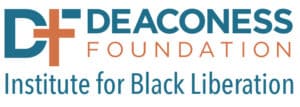Deaconess Foundation Launches Institute for Black Liberation

CHHSM-member Deaconess Foundation, based in St. Louis, announced May 30 the launch of its Institute for Black Liberation (the Institute), a novel approach to developing liberatory consciousness through healing the hurts of internalized racism. With an emphasis on developing liberatory consciousness, the Institute gives Black leaders in the Eastern Missouri and Southern Illinois region the opportunity to name, reckon with and heal from racial trauma and the pervasive effects of internalized and structural racism. The vision is bold. The applied learnings and transformational experience of the interdisciplinary, intergenerational institute will prime participants to accelerate the creation of conditions that promote a just, whole society and future with impact felt most profoundly within the Deaconess footprint.
“The well-being of the Black community and its people is determined not just by external progress but internal liberation from the profound impacts of white supremacy,” said Bethany Johnson-Javois, president and CEO of Deaconess Foundation. “With the Institute, we cultivate a much-needed environment of self-discovery, reflection, listening, and learning for leaders that will enable them to drive and sustain the societal change we want to see within the next seven generations.”
The Institute leads the way with a unique model that emphasizes the need for spaces dedicated to the healing and development of Black leaders. It centers Black lives, Black thoughts, and Black liberation.
“We firmly believe that we have the ability to free ourselves from the behaviors that resulted from the oppression we’ve endured and to build a community that reflects our truth,” said Rudy Nickens, program director of Deaconess Foundation’s Institute for Black Liberation. “The Institute is a space for us to acknowledge and define the effects of generations of dominant culture on our individual souls, lives, and our communities as a way to ground ourselves to recover from it and build a profoundly different future.”
The inaugural cohort will meet both in-person and virtually over the course of nine to 12 months, including facilitated all-day in-person immersion sessions, ongoing monthly two-hour virtual group sessions, and individual coaching. Participants in the Institute will take part in a process of self-discovery, reflection, intensive training and learning focused, in part, on healing racial trauma and promoting well-being, identifying and dismantling internalized oppression, examining and exploring strategies for celebrating racial identity, building power through collective development of leadership skills and kinship with others, and developing tools to sustain change through generations.
The Institute’s framework is inspired by the work of Dr. Barbara J. Love. She has written extensively about liberatory consciousness being a crucial means of ensuring liberation workers, who are “committed to changing systems and institutions characterized by oppression to create greater equity and social justice,” operate effectively (“Developing a Liberatory Consciousness”).
The multi-year pilot of the Institute is funded by the Robert Wood Johnson Foundation. With this grant, Deaconess will expand its role as an institutional advocate working towards the improved health of the Eastern Missouri and Southern Illinois communities. Plans and applications for future cohorts will be announced at a later date.
Applications for the Institute are now being accepted. The application deadline for the inaugural cohort is Monday, June 26. Applications are open to Black people, including people of African heritage, located within the Metropolitan St. Louis region, with a special emphasis on St. Louis City and St. Louis County, Missouri and East St. Louis, Illinois. Interested individuals may apply at deaconess.org/institute.
Join Our Mailing LIst
"*" indicates required fields
Follow on Facebook
Denise Buck to Succeed Campbell as IFM CEO - CHHSM
www.chhsm.org
As IFM Community Medicine (IFM) Founder and CEO David Campbell M.D. plans to retire mid-year, his successor, Denise Buck M.D., has started working full-time with IFM in St. Louis. Before assuming this...